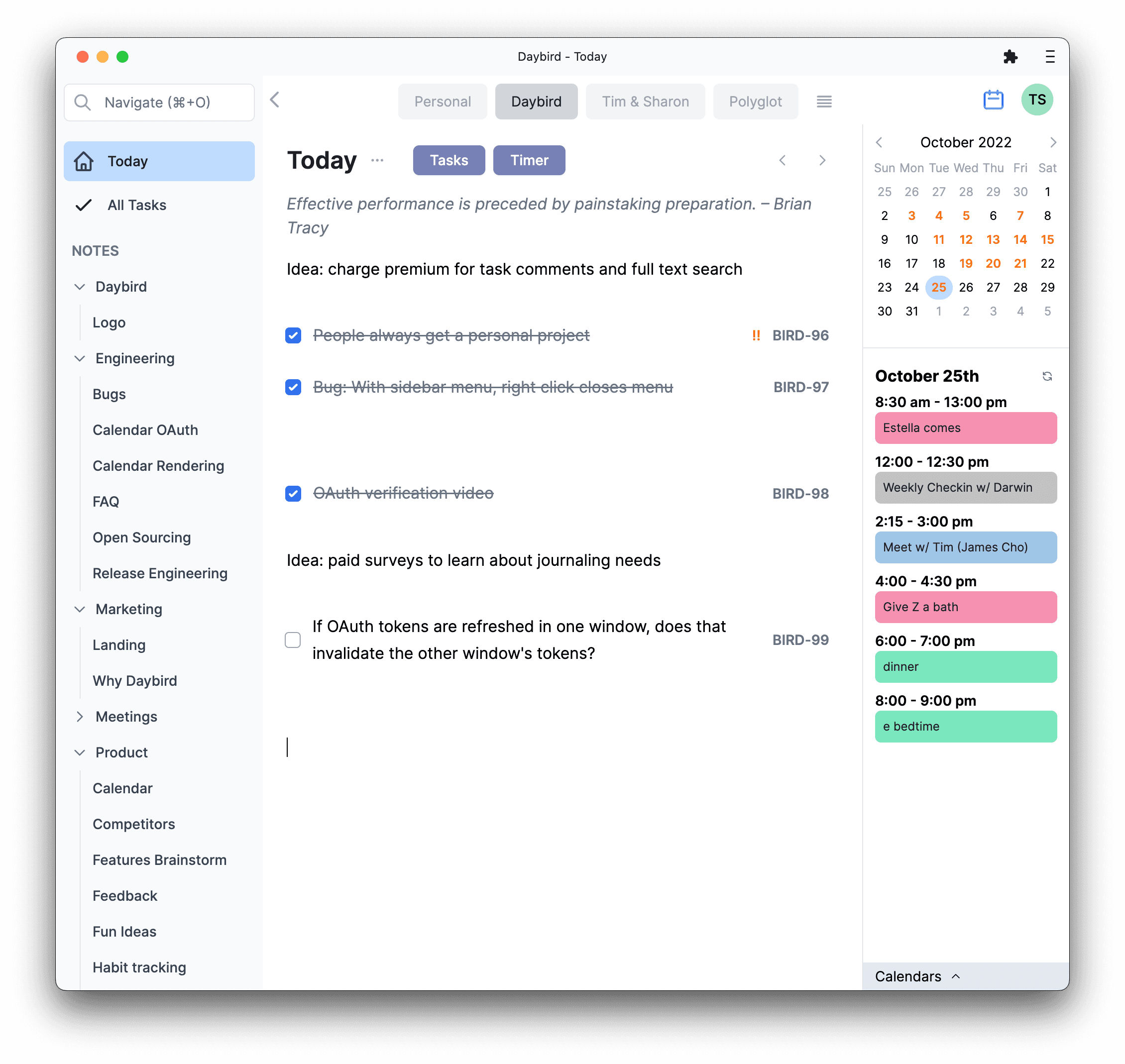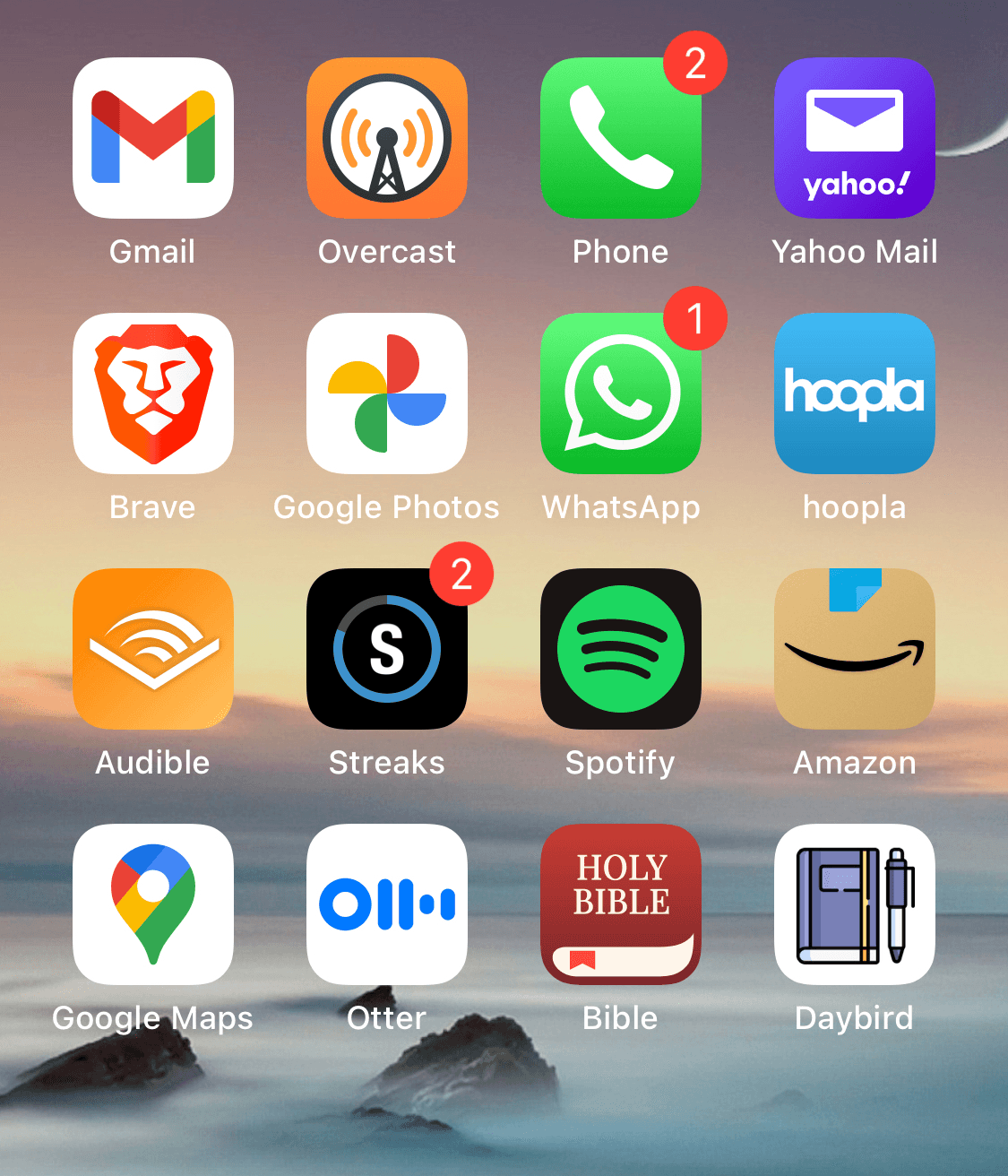Weekly Check-in: 10/25
Daybird Calendar, a few other updates
 Illustration by Kelsey Holmes
Illustration by Kelsey HolmesFor the sake of accountability, I am trying to regularly writing check-ins on my work in progress.
See all check-ins here.Last Week's Update
This year is flying by - the weather's turned, November waits in the wings, and the holidays are right around the corner.
Daybird
The good:
- Calendar integration is here. Now you can see events across all of your calendars while you plan your day. I'd like to build a cool visualization similar to Google Calendar but I stopped myself, as it's not necessary. Also now you can sign in to Daybird with Google.
- I had an idea around adding meditation features to help users calm themselves and reflect more clearly. It's interesting and a unique angle for this kind of product, so I want to lean into it. I manually did a 2 minute meditation before journaling and I found that it helped more than I expected.
- I fixed a bunch more bugs, added terms of service & privacy policy, and built a small pomodoro widget.

The bad:
- Having to go back and forth with Google about approving the OAuth Consent Screen.
- Right now I don't have a good "pain statement" other than my own.
On that last note, at this point I really need to talk to some new people. While biking, I had the idea to offer gift cards to chat with folks on Reddit, so I'm going to do that this week.
My grand vision for Daybird is to help people be more intentional with their time by introducing or improving their practice of journaling and planning. But why specifically users switch to Daybird from another product / flow is what I feel is majorly lacking.
Polyglot
Slowly making progress - it now works with jest tests. The Javascript ecosystem is crazy, but gradually I feel that people are consolidating on a few major stacks:
Webpack + Babel or Esbuild / Jest or Ava / React or Vue / Node.js or Python
I don't feel like I'm in "flow" on this project yet, so my next goal is to push forward until I have an end to end integration test for Daybird written in Polyglot.
Wins of the Week
-
Daybird Calendar integration is big - this was the last major piece to build. From here I'm going to go into discovery mode and talking to people.
-
Rode 25 miles this past week & discovered a few nice paths around the Los Altos Country Club
Learnings of the Week
Had a chat with a friend, we talked about an interesting idea - how many iterations does it take to find MVP? He brought up Weebly founder David Rusenko, who says it takes 20-30 iterations on average. Note that these aren't pivots (e.g. changing directions completely), but iterations (changing your product meaningfully within the same problem space).
I realized that I subconsciously have assumed it should take a lot fewer iterations, and am impatient with the process - "why aren't people using this?".
Another musing - as I was thinking about new ideas, I realized that I only use a handful of apps on the phone, but most of them offer unlimited possibilities in some dimension:

- Overcast (Podcasts) - infinite world of people talking about stuff
- Audible - infinite world of audiobooks
- Hoopla (Digital Library) - infinite world of library books
- Spotify - infinite world of music
- Amazon - infinite world of stuff
- Youtube - infinite world of video
- Browser - infinite everything else
- I don't really use FB / Insta / Twitter / Tiktok, but those are all infinite
These products are super addicting because you can literally find any content you want on them. This is what makes the phone so dangerous - it's basically the matrix of every form of content in every permutation.
This pulls me in two directions.
- If I want to build something addictive, try to leverage the power of the infinite.
- If I want to stop myself (or build something to stop others) from distraction and addiction, this is the heart of the issue.
Is it possible (and desirable) to abandon the infinite, in favor of the limited and curated? That's an experiment we've tried a few times here and there (Yahoo News Digest, anyone?) mostly unsuccessfully. Why?
- capitalism - it's better for companies to make more money than less money, and more content = more money
- feast/famine mindset - if there's a good thing out there, we want more of it
- curiosity - we crave the unknown. If we know there's some piece of information out there (say in an audiobook, or our friend's Instagram post), the temptation to go find it is incredibly strong.
If these three factors can be overcome, I believe we can introduce an alternate way to consume media that's more intentional and less infinite. Let's see if we can get there.
Goals
-
Q4: Polyglot released with 3 active users
- Did not reach my goal of working prototype last week. I'll try to build more momentum for this project by working on it more consistently.
-
Q4: Daybird released with 10 active users
- Next step is to talk to 10 journaling people and see what I can learn
-
Q4: Ride 270 miles
- 54 miles down, 216 to go.
Hasta la vista,
-Tim